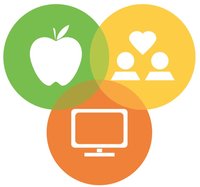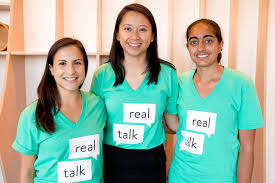More than any other time, the teenage years are confusing times. This couldn’t ring truer when it comes to sexual education: anxiety about pregnancy, STDs, and body changes abound! Fear not- RealTalk is here to help you with all of your innermost questions and concerns. Best of all, the content is youth-led! Join us for an AiT Exclusive interview with MyHealthEd’s Co-Founder, Cristina Leos, as she discusses the Real Talk app here!
What does MyHealthEd do and what is the Real Talk app?
MyHealthEd, Inc. is a tech non-profit that uses human-centered design to support the health and well-being for youth of every identity. Our first product is an iOS mobile app, Real Talk, that uses real stories written by teens to help teens ages 13 to 15 to learn about puberty, sexual health, and healthy relationships. Our goal is to bring high-quality, relatable sex education straight to teens on their phones.
Why is it important for teens to hear other teens’ experiences? 
When we started this project, we learned a lot about teens’ experiences with sex education and how they currently find answers to their pressing questions. One key insight was about the importance of learning from other teens who have been through similar experiences before, so our goal was to leverage the power of storytelling using technology. These stories help teens know that everyone has issues when it comes to puberty and relationships, and that they’re not alone. Real Talk also aims to reduce stigma and bias around these topics by normalizing stories about puberty, sexual health, and healthy relationships and highlighting stories of LGBTQ+ teens.
What are some of the common topics discussed on the app?
Our stories align with the National Sexuality Education Standards and focus on the topics that are most relevant and appropriate for young teens. This includes stories about puberty, bullying, healthy relationships, gender identity, and consent. We also update our content based on search terms and the most popular stories so that we are always publishing stories on topics teens care about the most.
What do you hope for the future of sex ed?
Teens have access to more information than ever through the internet and mobile apps. When teens can’t access the right kind of sexual health information, many of them will turn to pornography or other sources that don’t provide credible or accurate information. We see immense potential in using technology to have a positive impact on young people’s lives when it comes to sex education, so we created Real Talk to be a positive and engaging space for teens to turn to. We also see there are many voices and experiences that are not reflected in current sex education approaches, so my hope is that sex education will evolve to be more inclusive of teens’ needs, both in form and in content, in order to reshape these narratives to be more inclusive across race, socioeconomic status, geography, gender, and sexual identity. We are inspired by all the teens that have joined our community to make this possible, and we are excited to see Real Talk grow to have even greater reach.
Where can teens get the app?
Real Talk is publicly available for download via the App Store. Teens can also check out our Instagram page (@realtalkapp) where we include the latest story previews and a direct download link. Real Talk is currently available in iOS.
About the MyHealthEd Team: 
Cristina Leos is originally from El Paso, TX and graduated from Stanford University with a degree in Human Biology. She is currently a doctoral student at the UNC Gillings School of Global Public Health in the department of Health Behavior. Her work focuses on using innovative approaches to improve Latino adolescent health.
Liz Chen graduated from Princeton University in 2010 with degrees in Anthropology and Global Health and Health Policy. Upon graduating, she joined Teach For America and taught high school science in a rural area of eastern North Carolina before coming to the UNC Gillings School of Global Public Health to pursue a PhD in Health Behavior.
Vichi Jagannathan is a recent MBA graduate from the Yale School of Management. She also holds degrees in Electrical Engineering from Princeton and Stanford Universities. In 2011, she joined Teach for America to teach high school science in eastern North Carolina. Following her time in the classroom, Vichi led the expansion of Microsoft’s TEALS computer science education program into California.